
10 Urban Legends That Are Actually Based On Real Facts
As the "spooky season" draws near, many people are opting to focus a little more on the mysterious, odd, and sometimes downright scary. Whether it is through Stephen King books, horror movies, or simply browsing around your local costume shop, most people like to indulge in the spirit of the season in and around Halloween.
One commonality of the things mentioned above is that they are all fiction. From cannibalistic clowns invented in an author's mind to rubber props masquerading as monsters on screen, you can rest assured that, for the most part, your exposure to the creepy and the supernatural is just a figment of your creative imaginations. But how much of what inspires these fantastical stories is based on reality?
This article looks at some of the most popular urban legends from around the world that have either proven to be true or at least partly based on fact. Hopefully, this may spark your curiosity to figure out what truly goes bump in the night in your neck of the woods.
Bigfoot
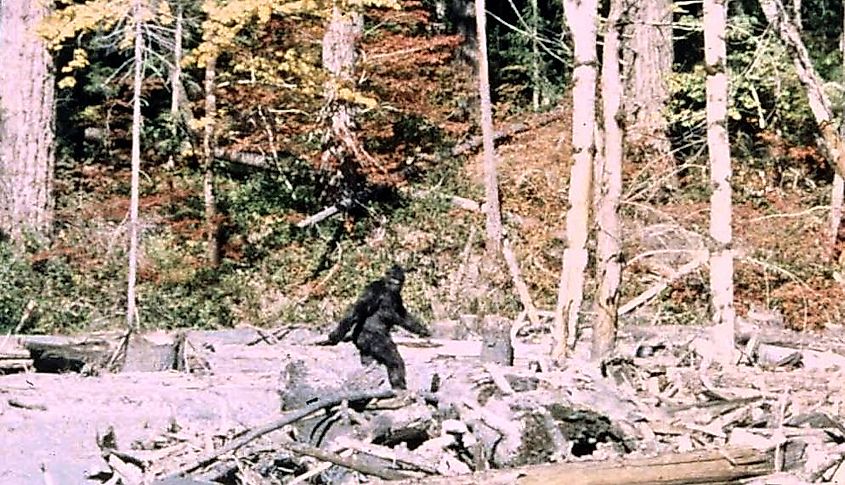
Don't roll your eyes quite yet. It is true that Bigfoot has since become a bit of a laughingstock in the world of cryptozoology. With countless hoaxes and little to no science proving that such a creature could even exist, there is little doubt that there really are giant hairy apes still walking around the remote woodlands of the world.
Note the word "modern," however. It is also true that the creatures that crawl the earth today, including humans, weren't always here. There have been many cycles of life in the hundreds of millions of years that life has called this planet home, from dinosaurs to the megafauna of the last ice age. There is strong evidence that a Bigfoot-like animal once existed. One of the main examples is the Gigantopithecus, a giant species of ape that died out around 200,000 years ago and very much resembled the mythical creature that some still think exists.
After the bones of one specimen were uncovered in China, scientists have since concluded that the Gigantopithecus inhabited much of southeastern Asia just around the same time humans began to spread across the globe. Have one or more Gigantopithecus managed to live unnoticed into modern times? Although highly unlikely, the existence of Bigfoot (at one point in time) now appears to be more fact than fiction.
Government Mind Control (MKUltra)

The idea of government mind control once seemed like a topic confined to conspiracy theories and urban legend. However, over time, declassified documents, eyewitness testimonies, and investigations have provided concrete evidence that such experiments were not just the stuff of science fiction. One of the most well-known examples is MKUltra, a CIA program that ran from the 1950s through the early 1970s. Initially dismissed as a myth, MKUltra’s existence was confirmed when documents were released under the Freedom of Information Act (FOIA) in the late 1970s.
The program aimed to explore techniques for mind control, often through the use of drugs like LSD, sensory deprivation, and psychological manipulation. Experiments were conducted on often unsuspecting citizens, including hospital patients, military personnel, and even prisoners. A popular book written about the subject, Chaos by Tom O'Neill, goes as far as strongly inferring that infamous criminal Charles Manson was heavily involved with the program. The goal was to find methods for influencing and controlling human behavior, particularly during the Cold War when fears of communist brainwashing and influence in America were at their height.
What was once considered speculative became a chilling reality, proving that government-sponsored mind control projects were not only real but possibly more widespread than initially thought, leaving lasting effects on unwitting victims. The legacy of MKUltra continues to shape discussions about government accountability and transparency to those who know about it.
Giant Squids
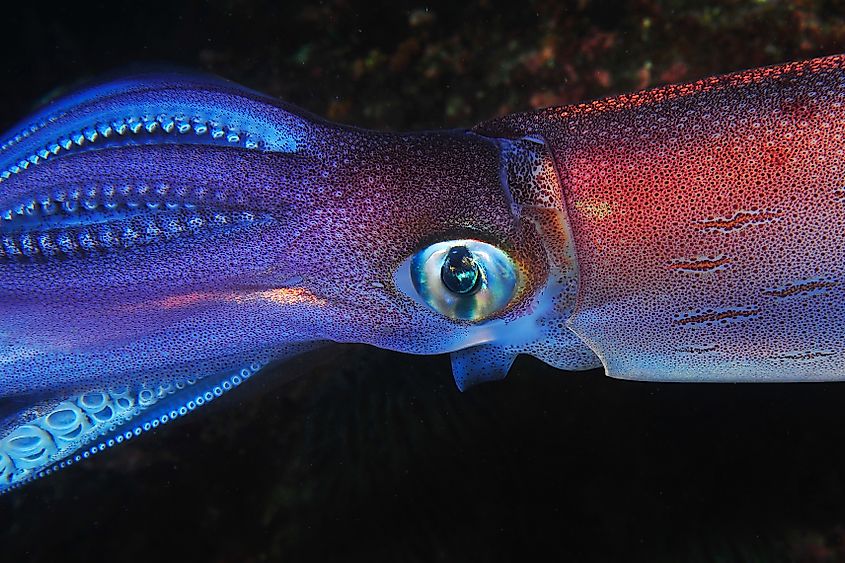
For centuries, sailors’ tales of giant squid—massive, tentacled sea monsters—were dismissed as myths or exaggerations. Sometimes called "Kraken," these legends fueled imaginations across several cultures, from ancient Vikings to more contemporary sailors navigating treacherous waters around the world. In more recent times, many believed the creatures were too outlandish to actually be real. However, as human understanding of the oceans has advanced, evidence supporting the existence of these deep-sea giants began to surface.
In 1857, Danish zoologist Japetus Steenstrup identified remains that were thought to belong to a species of giant squid. As technology improved, more direct encounters followed. The turning point came in 1870, when a number of intact dead squid washed ashore in Newfoundland, offering concrete proof of their existence to science. Then, in 2004, Japanese researchers captured the first images of a live giant squid in its natural habitat, around 900 meters below the ocean's surface. This confirmed that the elusive creature, capable of reaching lengths of up to 40 feet, was certainly not just a legend.
Today, scientists continue to study giant squid, learning more about their biology and behavior. What once seemed like maritime folklore has been redefined by science, reminding people that even the most unbelievable stories can have a basis in reality.
Laced Halloween Candy

This classic bit of folklore has stuck around in the minds of concerned parents everywhere, especially when Halloween is just on the horizon. It's long been a fear of the possibility of a deranged homeowner sticking razors or poison into Halloween candy meant to be given to trick-or-treating young children. Unfortunately, it turns out that this bit of mythos is true but not as accurate as many make it out to be.
Though deliberate poison is not known to have happened, with no known criminal cases on the official record, there has been at least one instance of trick-or-treat loot containing sharp objects meant to cause harm. One particular incident involved James Joseph Smith, a Minneapolis resident who was charged in the year 2000 for putting needles in snicker bars, causing minor harm to one child.
Given the millions upon millions of children who celebrate Halloween every year and the lack of actual instances of purposely tampered with candy, this is an example of how easily some urban legends can be completely blown out of proportion, especially when the health and safety of loved ones are seemingly at risk.
Alligators in Sewers

Is a sewer a good place for an alligator to live? This could be true in Florida or Louisiana, where the persistent heat and humidity can push any cold-blooded creature to live just about anywhere with ample water and food. It might surprise you to learn that one of the only proven instances of an alligator being found in a sewer was in good old New York City, where snow falls for five or more months out of the year.
In 2010, authorities in the borough of Queens fished a young alligator measuring 2 feet long out of the sewers. It is doubtful that it would have survived long, given New York's unfavorable climate and, frankly, the subpar water quality of its sewers. That said, maybe a system that has also been mythologized to have mutated a group of turtles into crimefighting ninjas.
Several other gator sightings have occurred over the years in other parts of New York City, often attributed to irresponsible pet owners letting them go into the "wild" after they begin to grow too big and unruly. Similarly, an adult Nile Crocodile was caught in Paris, France, in its sewer system in 1984. This croc was then transferred to a French aquarium, where it lived until 2022.
Cropsey
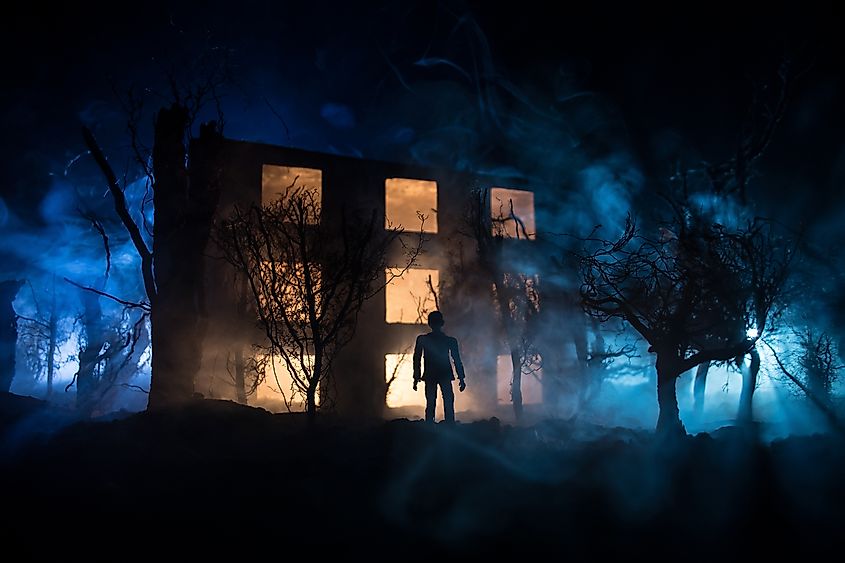
Serial killers are an all too real thing, with new ones seemingly coming out of the woodwork every year across the world. Although statistically, your chances of being caught by one are low, the knowledge that there are at least a few out there in your country currently is enough to spark a morbid interest in many of us. What happens when a popular urban legend, a "boogeyman," so to say, ends up being an actual serial killer? Well, you get Cropsey, a tragic story-turned-real-life monster.
In the 1970s and early 80s, children in Staten Island spread the legend of "Cropsey," an alleged escaped mental patient, axe murderer, and kidnapper who stalked the local streets. But a string of real-life child abductions and murders in the area led to the eventual arrest and conviction of Andre Rand, who ended up perfectly fitting the description of Cropsey and added legitimacy to the former urban legend that was seemingly taken straight out of a horrifying slasher film. Cropsey has gone on to become one of the most chilling urban legends that turned out to be fact, teaching people that even children's tales can often have some (and sometimes complete) basis in reality.
Strangers Living in the Attic
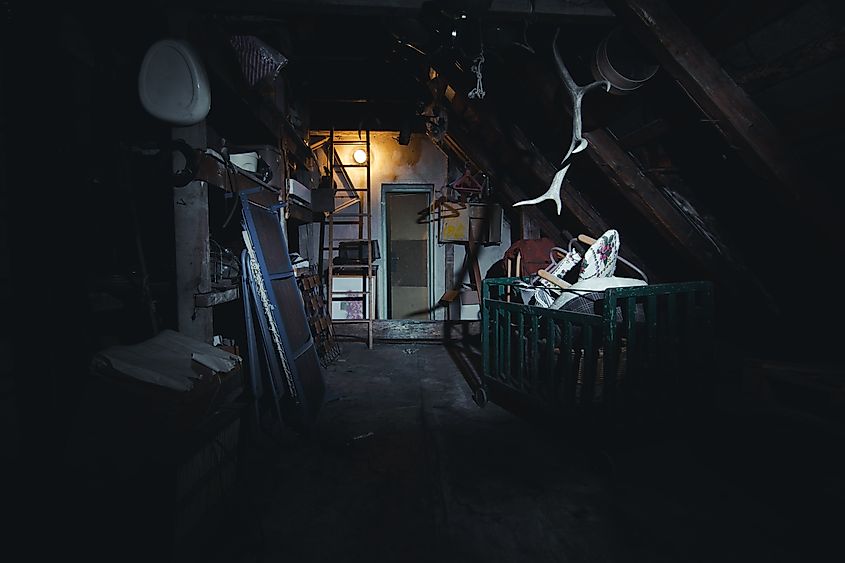
Stories have been passed around for ages about strangers secretly living in homes they do not belong to. They hide away until the homeowners go to sleep or take off for work, and then they raid the fridge and take other objects, leaving the legal residents of the house scratching their heads as their stuff mysteriously goes missing. The Academy Award-winning South Korean film "Parasite" is loosely based on this concept, in which a poor family attempts to secretly freeload off of the home of a rich family.
This is not just some scary story that people have made up to explain mysterious bumps in the night, but a real-life occurrence documented multiple times from various places worldwide. There are dozens of examples of this happening, actually, from clingy ex-boyfriends to homeless vagrants simply looking for somewhere warm to stay and other whacky/unsettling cases. Just know that those oddly real-sounding footsteps you hear at home when you're alone might not be proof that ghosts are real after all.
The Video Game Burial Site

This one is not really creepy at all, but not all urban legends have to be. Stories of buried treasure are as old as time, from pirate's gold hidden in booby-trapped pits to cities deep in the Amazon allegedly made of gold. While not as lucrative, there was a modern urban legend that followed a similar path.
In the mid-80s, when the popularity of video games began to wane briefly, rumors of a massive burial pit for unsold Atari games somewhere in the deserts of New Mexico made their way onto the scene. If some lucky kid found it, he'd have enough entertainment for him and his friends for a lifetime. However, this tale progressively became less cool when the story began to be that the trove of video games was actually just a pile of unsold copies of E.T. the Extraterrestrial, a game that, unlike the movie it was based on, is considered one of the worst of all time.
The burial site that was originally reported to be the site was finally excavated in 2014 just outside of the city of Alamogordo in southern New Mexico, revealing that there truly was a massive pile of Atari game cartridges, along with some other game hardware, hidden underground. Although only around 1,300 cartridges were recovered, including many different games (with E.T. in the bunch), there are still an estimated 700,000 cartridges in the landfill.
Zombies
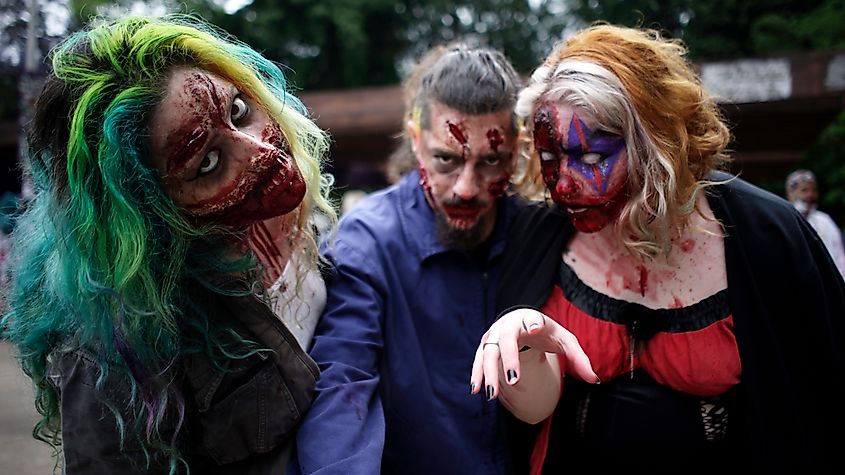
Zombies are among the most popular movie monsters ever imagined. Ranging from the lumbering undead or voodoo zombies to the more modern depictions of virally infected and fast ones, one thing you can be thankful for is that zombies are not real... or are they? Although there is no proof of bodies being raised from the dead from evil magic or laboratory-made viruses, there are some real-world examples of what could only be described as none other than zombies.
For example, scientists have witnessed how the Ophiocordyceps unilateralis fungus has been able to infiltrate the bodies of ants in order for them to do their bidding. This unique fungus changes the ant's behavior to make it easier for it to spread its spores and procreate. This behavior change generally causes the infected ant to climb to a higher elevation (usually the top of a plant) and simply wait for death. From this vantage point, the fungus spores can spread more widely across the surrounding area.
Another more pertinent example can be the widespread use of bath salts emerging in the early 2010s, or more so, the effects of said bath salts. The most famous case regarding this was what is now dubbed as the "Miami cannibal attack," in which a man, allegedly high after smoking the mind-altering drug, attacked and ate the face of a homeless man in May of 2012, leaving him blinded permanently. Although it is inconclusive whether or not the attacker was high on bath salts, its effects have been documented numerous times across the internet to be in line with what one might imagine a real-life zombie to look and act like, hence why this drug was widely blamed as the reason behind the brutal attack.
Snakes in the Plumbing

It's late at night and you are relieving yourself on the toilet. As exposed as you are, you're perfectly safe, for what could possibly pop out of the bowl beneath you? A snake, perhaps? Many stories have been passed about the potential of these slithery creatures making their way through plumbing. Their elongated, tubular bodies and amazing flexibility make it almost like they are made for it. So much so that there are, in fact, several examples of this happening.
Just recently, in 2023, a woman in Texas was in her bathroom early one morning when she heard writhing sounds coming from the toilet bowl, only to next discover a rat snake popping its head out of the water. There are several other similar stories from across the country, from corn snakes making their way up New York skyscrapers through the pipes to entire groups of these reptiles turning septic tanks into lairs for breeding and hibernating over the winter.
What To Learn From True Urban Legends
It is evident that simply dismissing all urban legends is not always a wise choice. From real-life serial killers who were once mere children's stories to cryptids that truly walked (or swam) this earth at one point, a lesson can be learned about how urban legends are formed- that many of them have at least some basis.
What unique local legends do you know about? Have you ever tried investigating their origins for yourself? Whatever it may be, just be aware of what rabbit hole you could take yourself down. You may just find that truth is sometimes stranger than fiction.











